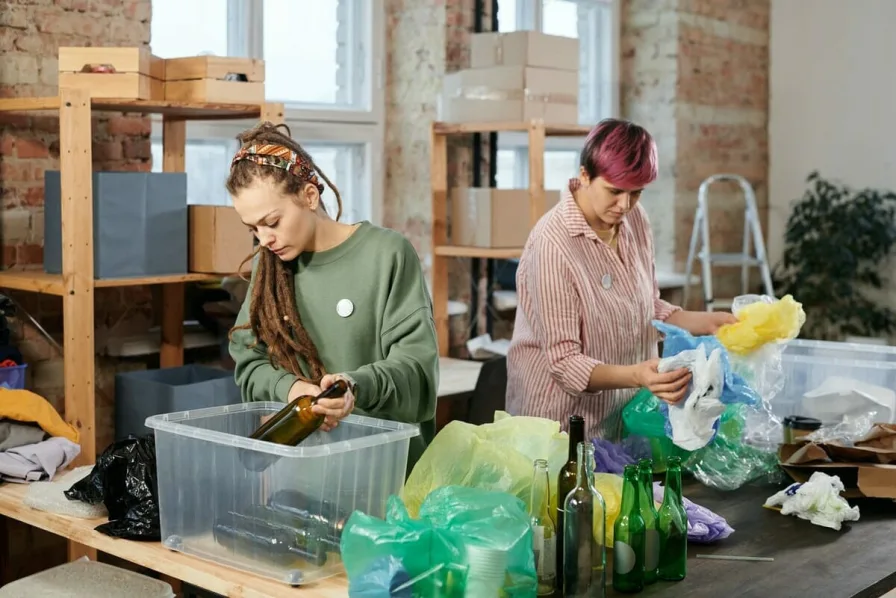Whether we like it or not, almost everyone has been guilty of wish cycling sometime in our lives. For those new to the term, “wish cycling” describes the practice of recycling with the hope of it being recycled while not knowing completely. From beginner environment enthusiasts to passionate recyclers, there's always some lingering confusion over whether something should be recycled or not. This confusion—whether it stems from unclear government regulation or localization of recycling centers due to a lack of a set standard— causes many to make poor decisions and do more harm than they would’ve if they’d just decided to not make the choice and just thrown the item in the garbage automatically. The issue seems obvious and yet, so many fail to grasp it’s important—it might even be you reading this right now. To test your skills, let’s answer a few true or false questions to test your knowledge. Maybe then we can all take a little more responsibility in protecting our environment.
Decode Environmental Myths (True or False):
1) Unwashed takeout containers are recyclable. Nothing will happen. They'll wash them before, right?
FALSE; the food on the takeout containers contaminates the other good recyclables and makes the entire batch unusable at the recycling centers. Wash your containers or just throw them in the trash instead.
2) Anything that looks recyclable probably is.
FALSE; making the opposite assumption is a safer bet since a wrong decision could cause lots of other issues. For example, the Starbucks disposable coffee cups can be recycled, right? Wrong!
3) If you don't know if an item is recyclable or not, just recycle it! You could be helping and you're preventing those items from going into landfills!
FALSE; again, you are taking a risk that could be more harmful than beneficial!
4) You can recycle plastic bags. Plastic is in the name, right?
FALSE; although plastic bags are recyclable, they are not to be put in your house’s general recycling bin. They can cause issues with the machinery at recycling facilities. A safer option would be to drop them off at one of the many retail stores that have plastic bag recycling programs.
It’s totally okay if you got any of these wrong but hopefully—by the end of reading this article, you’ll be better equipped to face that same question, to recycle or not, a little bit better.
Why is wishcycling so harmful?
Wishcycling has numerous harmful effects. These include cross-contamination, damage of recycling facility equipment, and even risks to workers’ safety.
To begin, cross-contamination is when valuable recyclables come into contact with contaminated items, resulting in both items becoming contaminated and unusable for the recycling process. This is where the majority of the issues with wish-cycling stem from. So, so many fall into this trap of recycling without complete surety of whether it could be harmful or not.
In order to fix this issue, let’s clarify what a recyclable is. Recyclables containing food, residue, or dirt are constantly found in recycling facilities. Those extra recyclables are not only ineffective in terms of contributing to the environment cause (as they are not true recyclables) but they actually prevent the good recyclables from being used. For this exact reason, it is imperative to adapt a “when in doubt, throw it out” mindset. Never ever assume that something is recyclable. If you are not 100% sure, don’t fall for the wish-cycling mindset. With that in mind, it is encouraged that you do some research on your local recycling facilities. It will only take a few minutes and can make a huge difference. Rules vary by location and those are always important to consider before making any decisions.
Next, on the damage of recycling facility equipment. The machines aren’t built to deal with non-recyclables. When they are exposed to the products of wish-cycling, the sorting machinery could be damaged and cause harmful and even costly delays for the facility to continue their processing.
Worse than the damage to the equipment, in fixing these issues, workers put their lives at risk by going into the machines. Some items can light on fire when in the machinery, providing a risk to nearby workers and the entire facility itself.
Overall, here are a few steps you can take right now:
- Read up on your local recycling rules
- NEVER assume if something is recyclable or not
- Reduce plastic use in the first place
Who is contributing to the change?
As climate change progresses, big companies have started to reduce their widespread impacts. Notably, Amazon, a major brand, has started contributing to the cause of preventing wishcycling. The company's Vice President of Mechatronics and Sustainable Packaging Pat Linder voiced, "The removal of 95% of our plastic air pillows is another step in our path to avoid and reduce packaging—and part of our multi-year effort to remove plastic delivery packaging from North America fulfillment centers." It is clear that Amazon and many other large companies have been taking these steps forward to mitigate their impacts. Undoubtedly, other companies will follow suit in a similar way.
We’re not here to make you feel guilty about your past recycling actions. Instead, remember them, address their issues, and take it as a reminder to not repeat the same mistake. At GreenWaySquad, we encourage climate education and action in our own communities and lives. By making the shift from being a wishcycler to a recycler, we can all do our part for a better planet.

